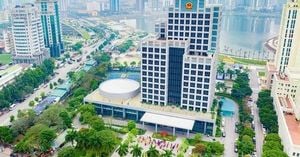[WASHINGTON, D.C.] – A sudden shift from the U.S. State Department has left visa applicants scrambling as the eligibility for visa interview waivers has tightened considerably. This abrupt update returns to the pre-pandemic rules, drastically reducing the window for applicants to renew their visas without attending an in-person interview from 48 months to just 12 months.
The implication is significant for countless nonimmigrant visa holders, impacting their ability to travel, study, and work in the United States. Previously, the 'Dropbox' option allowed individuals seeking renewal to bypass the often-lengthy interview process, saving time and reducing anxiety, particularly for those already deeply invested in their life and work across the U.S.
Under the new law, hardly anyone seems to have seen it coming, which has led to confusion and panic among those who depend on timely renewals to maintain their status. The changes were quietly incorporated last week on the State Department's official website, catching many applicants off guard, who now face the risk of their visas expiring during extended wait times.
Maria, for example, is a nurse from the Philippines on an H-1B visa whose status is due to expire soon. The waiver's previous provisions would have allowed her to renew her visa quickly under the old policies, but now she faces the uncertainty of indefinite delays and the large possibility of her visa lapsing before she can secure her interview.
Steven Brown, a recognized attorney specializing in immigration law, critiqued the changes. He remarked, "This feels necessary to no one," as those who depend on the process are not being served. He noted, "These are people who have already had visas and have been vetted; restricting them now seems redundant. They are not aliens trying to slip through the cracks; they are established members of our workforce."
A more significant concern, highlighted by immigration law expert Tom C. Narvaez, is the ripple effect this will have on the already burdened U.S. embassies and consulates. The changes to interview waivers will undoubtedly lead to increased wait times for appointments at consulates worldwide, spurring what could become severe backlogs for applicants forced to adjust to the new regulations.
"Those already scheduled for appointments based on the previous rules now face the dilemma of having to cancel their plans and reschedule. It causes inconvenience not only at the personal level but also for our embassies, which handle the surging number of requests, especially under high-demand situations," said Narvaez.
Sitting at the heart of this issue are those who had already planned to travel to the United States. Miriam Thompson, another prominent immigration attorney, reported instances where individuals arriving at consulates for scheduled appointments were turned away because of the abrupt policy shift. "People have traveled internationally to submit applications under old rules, and now they're being asked to rework their plans significantly. This kind of last-minute change can be incredibly disruptive."
The rollback announced has not only been met with criticism but is also acknowledged by some as necessary for tightening security, aimed at eliminating any potential misuses of visa waivers. Advocates for stricter immigrant regulations have celebrated this decision, calling it incredibly valid, citing national security as being more important than any minor inconveniences faced by applicants.
Despite the varied opinions on the matter, experts agree on one point: clarity is severely lacking. The State Department's guidance following this policy change leaves many questions unanswered for those caught up within it. Applicants experiencing difficulties are encouraged to pay close attention to updates and monitor their eligibility closely against the shifting guidelines.
Those potentially eligible for renewals will have to act quickly, as the new, stricter policies could lead to longer delays than ever, with no clear timeline established for when they can expect to hear back from embassies and consulates. The time it takes for visa processing has increased for many different categories, and applicants are advised to prepare well and expect longer wait times than before, especially for popular regions where visa demand is high.
Affected groups include H-1B work visa holders, international students, and even tourists who previously enjoyed the convenience of the waiver program. They must now adapt rapidly or risk having their legitimate travel, academic, and work plans delayed indefinitely.
Moving forward, visa applicants are urged to get their documents ready and apply as early as possible. Staying informed on changing policies and specific consular backlogs will be key strategies amid this turbulent immigration atmosphere.
How this significant policy change will impact the immigration system long-term remains unclear. Still, what is evident is the immediate spike of anxiety among those affected and the urgency needed to navigate this fraught aspect of U.S. immigration policy.



